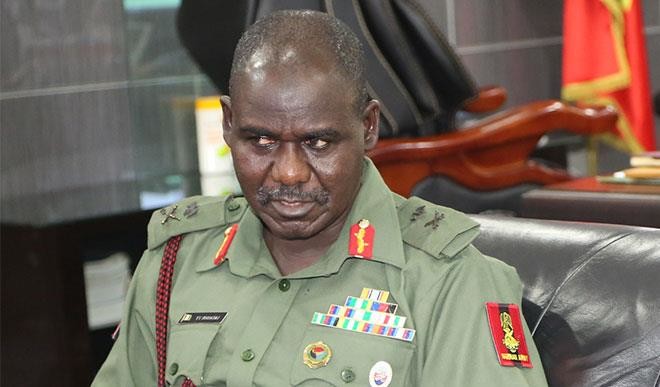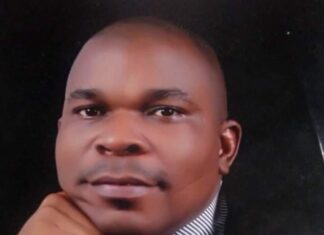By Ikechukwu Amaechi
I met Chief of Army Staff, General Tukur Buratai, for the first time on November 7, 2016 at a seminar the Nigerian Army Resource Centre, Abuja organised on “Assessing the threats of Boko Haram insurgency in Nigeria.”
Also in attendance were the cream of Nigerian security forces, editors and a team from the Atlantic Council African Centre, Washington, led by its Director General, Peter Pham.

Buratai was the special guest of honour.
The two lectures delivered by Professor Mohammed Kyari, Vice Chancellor Modibbo Adama University of Technology, Yola; and Major General Leo Irabor, Theatre Commander, Operation Lafiya Dole; looked at various aspects of the Boko Haram insurgency.
Kyari assessed the impact of the insurrection, Irabor focused on the role of the army in combating it.
The papers discussed by Dr. Freedom Onuoha of the University of Nigeria Nsukka and Pham on the one hand and Brigadiers-General Ben Ahanotu and Msheila on the other, generated interesting debate.
The military was not particularly happy with the public impression that it was trampling on human rights in waging the war against insurgency.
While there may have been cases of abuse, the military hierarchy insisted they were exceptions rather than the norm.
Irabor enumerated efforts in winning the hearts and minds of the locals and what the soldiers were enduring in order to degrade Boko Haram that had levied war against the Nigerian state since 2009.
The government claimed then that Boko Haram had been technically defeated. President Muhammadu Buhari amplified that assertion, without evidence, that the group was hitting soft targets as a result of its incapacitation.
Buratai himself was upbeat, already doing the victory dance.
But in the same period, the remains of Lt. Col Mohammed Abu Ali, who was killed in an ambush in Borno State, were about to be interred at the National Military Cemetery in Abuja.
The false narrative concentrated my mind at the seminar.
When it was time for questions, I asked Buratai to explain the incongruence between the narratives of a weakened insurgency and rising military body bags. He ignored the question.
I joined the Nigerian editors and the delegation from Washington who were invited to visit Borno State.
In Maiduguri, the team was divided into two groups. To see things for myself, I went with the group led by Major General Johnny Hamakim, Director General, Nigerian Army Resource Centre.
Others in the group included then Army Spokesperson Col S.K. Usman; Col A.S. Ndalolo; and the delegation from Washington – Pham, Julian Wyss, Mary Carlin Yates, former U.S. Ambassador, her husband; former U.S. Ambassador, John Yates; and retired U.S. Army General, Carter Ham, former African Command (AFRICOM) Commander.
We went to Pulka in Gworza Council, Borno State. That was on November 9.
The rugged military helicopter took off at about 9.23am and landed at the 121 Battalion base at 10.05am.
What I saw in Pulka, a community about two hours’ drive from Sambisa forest, the epicentre of the Boko Haram insurgency, was fascinating.
Outside the military base, standing in front of a group of pupils, with his fully loaded gun slung on his shoulder, was Corporal Adam Ibrahim, teaching pupils of Pulka Nursery and Primary School, run by the Alpha Company of the 121 Battalion.
Opened on January 7, 2016, the school was not much of what it claims to be, for it had no such paraphernalia. There were no desks and tables. No classrooms!
About 100 pupils in different classes sat on grasses or stones under trees in the scorching sun, wearing all manner of dresses, some mere rags. But they all seemed keen to acquire education, a repudiation of the core philosophy of their tormentor-in-chief, Boko Haram, which insists that Western education is a taboo.
Rather than the usual instruction materials, there were guns everywhere. Ibrahim’s gun dangled on his shoulder, his colleagues from the Alpha Company, who were also emergency teachers, leaned theirs on tree trunks.
“The guns can never be really far from us, no matter what we do, because this is still a war zone. In the night, we do sentry work and in the morning, we teach the pupils here.
“And if in the course of teaching, there is a security threat, we abandon the teaching and deal with the terrorists. That is our life as soldiers,” explained Ibrahim, who taught English and Hausa.
The school was, for me, an incredible metaphor of the people’s determination to defy terrorists and make the most of a really bad situation. It epitomised the dogged resolve of the embattled indigenes to claw back whatever remained of their lives and forge ahead.
The enthusiasm of the pupils to learn in the face of overwhelming odds was inspiring.
But most importantly, the trip amplified the grossly understated role soldiers were playing in putting a balm on the scars of war.
Aisha Musa, 11, the head girl of the emergency school, said the entire community had the soldiers to thank for everything.
“Without these soldiers, we wouldn’t have been here. When the terrorists captured and burnt down the community, we ran away to Maiduguri. We only came back this year (2016).
“This school has helped a lot. We are determined to learn and acquire education and the soldiers are helping us a lot,” she said.
Meanwhile, Lt. Col. Muritala Danjuma Abdulsalam, the Commanding Officer of 121 Battalion, one of the young officers drafted by the Goodluck Jonathan administration to make the final push and liberate the areas held by Boko Haram when the 2015 elections were postponed, epitomised all that the military should be proud of.
Not only did he, together with late Abu-Ali, lead the team that initially moved into Sambisa forest, when Gworza was liberated, the military high command pulled him back to Pulka to consolidate and ensure that Boko Haram never regained foothold in the area.
I have narrated this story because of Buratai’s recent thin edge of the wedge comment on Nigerian troops in the frontlines.
On June 18, he lampooned soldiers for allegedly displaying a poor commitment to defend the country.
“It is unfortunate, but the truth is that almost every setback the Nigerian Army has had in our operations in recent times can be traced to insufficient willingness to perform assigned tasks or simply insufficient commitment to a common national and military course by those at the frontlines,” he said.
This outburst is a doubling down on his earlier allegation in a secret memo leaked to the media last August that military commanders and soldiers in the Boko Haram war were cowardly.
This camel’s nose, domino fallacy gambit is a shame. In some climes, a commanding officer in Buratai’s shoes will fall on his own sword or at least resign honourably.
We are, indeed, a special breed. No dignity. No honour. Therefore, Buratai would blame every other person but himself for the sad turn of events.
Yesterday, he blamed disgruntled politicians. Today, he is blaming soldiers fighting with bare hands. That is cowardly.
But Buratai is only being smart by half in a desperation to save his own skin, an inelegant ploy to divert attention from his gross incompetence.
He may revel in the fact that Buhari on June 10 passed vote of confidence in law enforcement agencies and their commanders, including himself, when a delegation of Zamfara Advocacy Group visited him in the Villa.
But the mounting body bags will forever remain a rebuke.
The soldiers I interacted with in Borno State more than two years ago were not cowards. They were not traitors. They were not quislings. They rather complained about inadequate food and weapons.
They complained of enduring weeks without allowances, which even when paid were grossly inadequate. Some had become suicidal because of poor welfare, I was told. Many of the deaths were not reported.
Buratai knows this and has done little or nothing despite the billions of naira voted every year for security.
We were told that Boko Haram was defeated, literally. The president claimed the group had been so degraded it can only attack soft targets, the last spasms of a dying monster.
False!
Now, more than ever before, the jihadists are attacking more military facilities than markets, motor parks, schools and worship centres.
At least two lieutenant colonels and more than 50 other soldiers have been killed in Boko Haram attacks in the last one month, with many more missing in action. Most of these fallen heroes are buried in unmarked graves, unsung.
The least expected of a commanding officer in the circumstance is to show leadership, not engaging in a blame game.
Buratai’s absurd extrapolation is self-serving and can only further demotivate the long-suffering troops, with catastrophic consequences.













